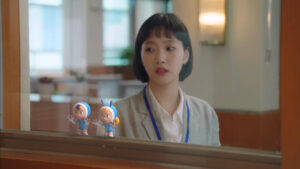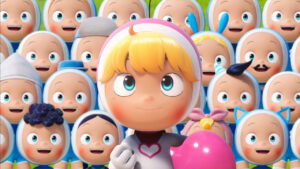
When it was first announced that Yumi’s Cells was receiving a live-action adaptation, fans of the webtoon were excited — but also worried. The original webtoon by Lee Dong Geun was one of Naver Webtoon‘s most popular series, amassing a total of 3.4 billion views in its five-year run. As if the drama didn’t already have big shoes to fill, it also had to pull off an ambitious feat of melding both live-action and animation. And pull off it did, exceeding expectations as probably the first Korean drama that used a mixed media medium.
This review contains spoilers.
Yumi’s Cells tells the story of a 31-year-old office worker, Kim Yumi (Kim Go-eun), as she navigates work life and relationships. What sets this narrative apart is its attention to introspection, personified by 3D-animated “cells” representing various hobbies, moods, interests, skills and even body parts. As opposed to being clones, every cell has a unique personality, making Yumi’s world vibrant and exciting.
Presenting the abstract world of Yumi’s inner psyche together with her outward behaviour through a drama can prove to be a challenge, not to mention holding both in balance. Too much emphasis on the inner world could make Yumi feel like a robot controlled by mini aliens, and too much emphasis on the real world could make the cells feel like backseat drivers. But the drama captures the balance that the webtoon achieved by blurring the lines between both worlds.

In the first episode, we hear the cells before we see them. The drama starts off with a narrator introducing “our Yumi” to the audience in third-person: she’s single, doesn’t have a boyfriend, but is happy with the way things are. This narration shifts to a second-person commentary that tells her to focus on her work once Yumi meets her office crush, Chae Ugi (Choi Min-ho). But quickly, the comment is undercut by a different voice that urges her to resolve her curiosity about Ugi instead of working. It is after the drama establishes that these voices are diegetic sounds that impact Yumi’s actions, while also echoing her thoughts, that we are taken into the animated world of Yumi’s cells.
At once, we understand that this animated world has a symbiotic relationship with Yumi in the real world; neither is controlling the other. Rather, the animated world is merely a reflection of Yumi’s concurrent thoughts. Besides the use of narration and commentary, the drama also blurs the lines between both worlds through visual means — sometimes the cells cross over to the live-action scenes, sometimes the live-action scenes have comic-like lines for dramatic effect, and in one instance a live-action Yumi even crosses over into the animated cells’ world.

The team behind the drama truly deserves huge props for the natural blending of both worlds. Director Lee Sang-yeob directed both live-action and animation scenes to ensure that the drama felt like a coherent whole. Sidus Animation Studios (known for animated series like Running Man) and Studio N (a subsidiary of Naver Webtoon), nailed the 3D animation of the cells which did not feel out of place even when they were in the real world. Last but not least, the stellar cast of voice actors and actors truly enhanced the personality of every cell and character. The voice actors, in particular, made sure that their voice acting captured the personality of the cells while not being over-exaggerated for live-action scenes.
In terms of the narrative, people might be turned off by the seemingly mundane premise if they’re not fans of the slice of life series. But because the narrative is told through the perspective of the cells, the mundane happenings in Yumi’s Cells are dramatised, making the genre more palatable for viewers used to romcoms. Small situations are provided with witty explanations in the cells’ world — Yumi’s hunger cell grows gigantic at midnight, causing her to crave late-night snacks, when Yumi can’t muster a smile it’s because her reaction gauge is broken, and when Yumi hears that Ugi is interested in someone else, her cell village faces a catastrophic flood as she breaks into tears.

In contrast to the cells’ expressive reactions, Yumi’s outward expressions are usually more subdued as she tries to hide what she is feeling. And yet, Kim Go-eun nails these subtle emotions, bringing Yumi’s awkwardness and loveliness to life. Similarly, Ahn Bo-hyun, who plays the rough but sweet Koo Woong, arguably makes the character more sympathetic than the original. While the webtoon typically presents Woong with a deadpan expression especially towards the end of their relationship, Ahn Bo-hyun’s acting magnifies the discomfort and embarrassment that Woong faces, humanising the character and garnering sympathy.
My only gripe with the drama then, is that since the drama gave a more sympathetic portrayal of Woong, Woong and Yumi’s breakup at the end of the drama feels abrupt and unjustified. While the webtoon’s Woong delivers the breakup lines coldly, Ahn Bo-hyun delivers them with a certain apprehension and sadness, signalling that it is not something that he really wants to do. The breakup leaves the viewers feeling sour as the credits roll on the first season. It comes as a shock, especially since both still clearly like each other — Woong had just recently prioritised Yumi over himself and Yumi was still missing Woong during their hiatus.
As viewers, we wish that Woong had communicated his financial concerns and insecurities to Yumi, instead of letting misunderstandings fester. But with all things considered, perhaps that is exactly why the breakup had to happen. As in real life, breakups are abrupt and caused when issues are not resolved, as much as both leads like each other.
This brings us to the final point, which is that Yumi’s Cells doesn’t follow the traditional rom-com structure. Relationships don’t survive on feelings alone. The romance isn’t us-against-the-world, and there’s no guarantee that the main couple’s relationship will last through thick and thin. Instead at its core, the drama is about self-love. In episode 14, the drama nails in this point when Yumi enters her cell world in a dream. There, a cell calmly tells her that there was never a fixed male character in her story; there is only one main character in her life, and that is Yumi herself.
Ultimately, Yumi’s Cells is wholesome, full of charm and witty in its presentation of our inner psyche. At times the cells give us privy to Yumi’s thoughts, at times they give voice to the audience’s reactions. But at the end of the day, perhaps what makes the drama so enjoyable to watch is the thought that there’s an army of dedicated cells that is always on your side, no matter what happens.
With Season 2 already in the works, we can look forward to Yumi’s story, her growth, potential romance with Bobby Yoo (played by Jin Young) and of course, her cells working together to bring Yumi happiness.
(Youtube. Images via tvN.)


